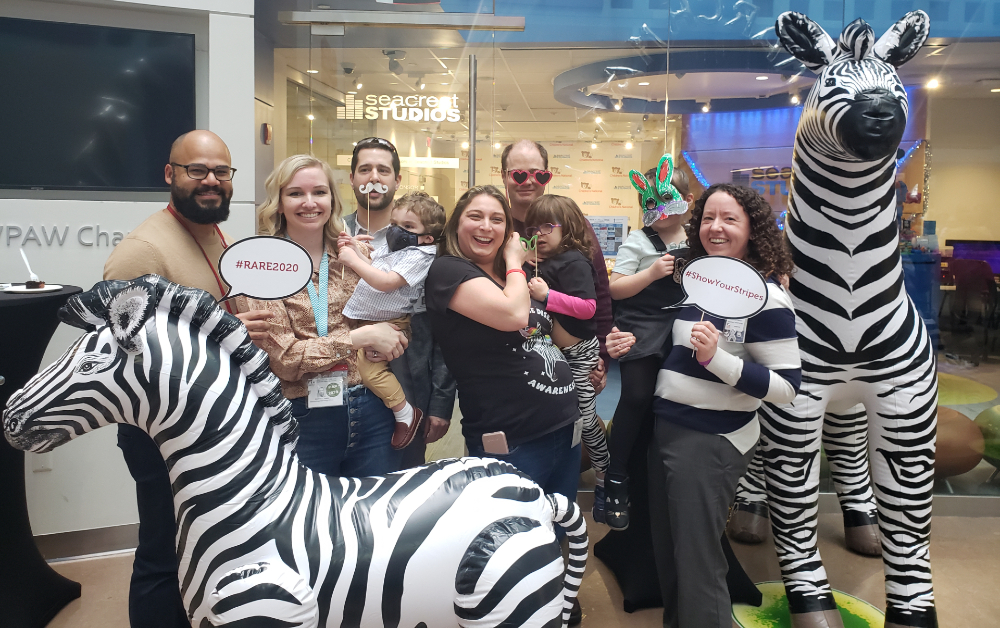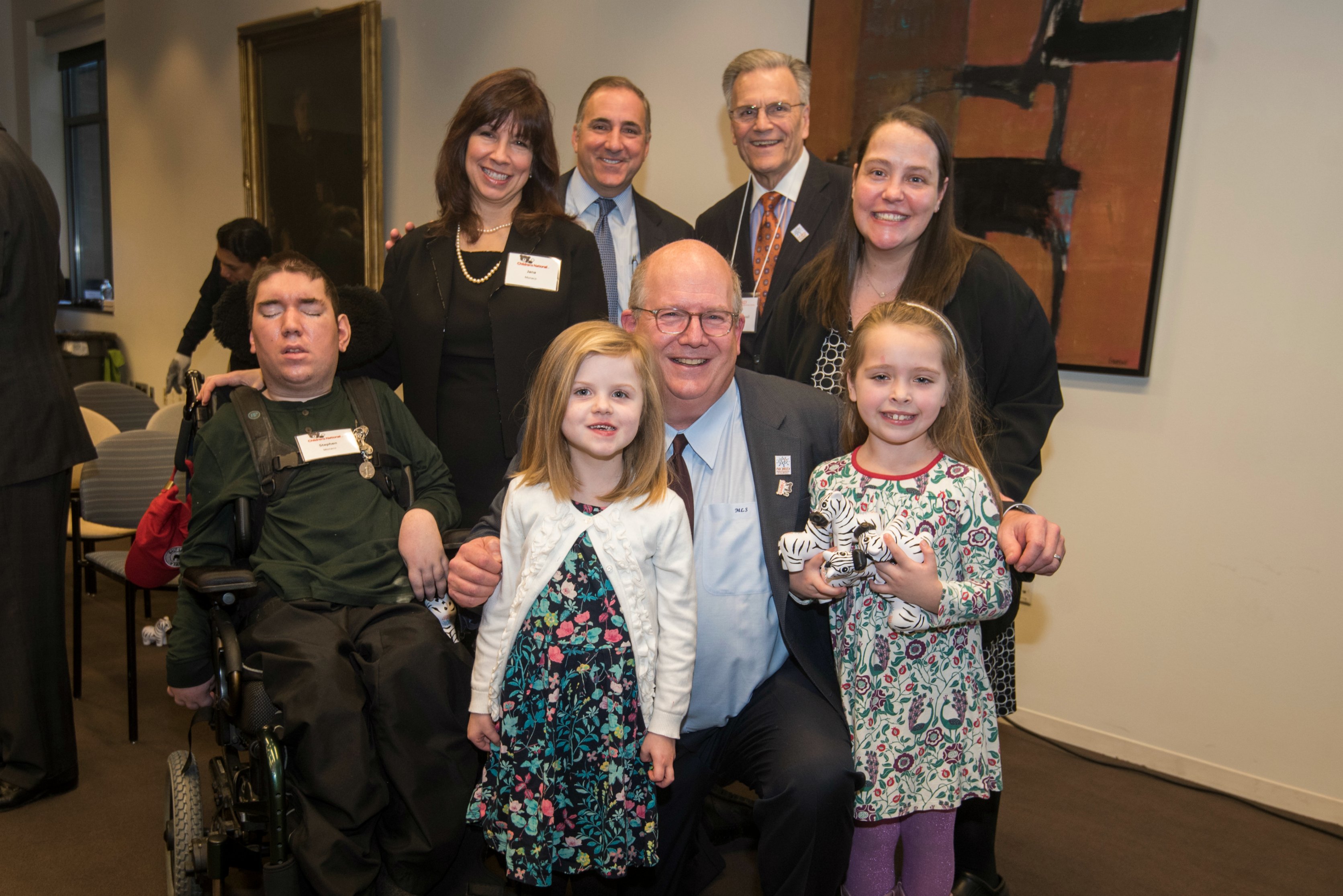

- Washingtonian magazine recognizes “Top Doctors” in 27 specialties from Children’s National Hospital
Washingtonian magazine’s annual list of the region’s “Top Doctors” recognized 68 Children’s National Hospital physicians from a wide-array of specialties. The list recognizes the region's best doctors nominated by other physicians in Washington, D.C., Maryland and Virginia. - Teen leaves wheelchair, takes parachute jump in view of fellow Potomac Falls HS students
Ryan Alam, a high school junior who receives care at Children's National Hospital for an extremely rare neurodegenerative disease, took to the skies and soared with a member of the U.S. Army Parachute Team, the Golden Knights. - Children's National Hospital Rare Disease Institute and Takeda partner to standardize care for patients with rare diseases
A five-year commitment from Takeda will help Children’s National launch a first-of-its-kind rare disease clinical protocol program. - Children's National Geneticist Natasha Shur, MD, Recognized with Rare Impact Award
The National Organization of Rare Disorders calls this year's class of its Rare Impact Award honorees "a strong, inspiring group, each making an impact on the lives of the rare community in a different way." Dr. Shur works in Children's National Rare Disease Institute. - Global Commission Presentation at 2020 NORD Breakthrough Summit
On October 8 and 9, 2020, the NORD Breakthrough Summit connected stakeholders from across the rare disease space to advance meaningful dialogue with an aim to improve the lives of over 25 million Americans living with rare diseases. - Washingtonian magazine recognizes Children’s National Hospital physicians as “Top Doctors” in 25 specialties
Two Rare Disease Institute physicians were named to the list – Jamie Fraser, MD, PhD, and Kenneth Rosenbaum, MD - Using telehealth to revolutionize the speed of making rare disease diagnoses
Marshall Summar, MD, director of the Rare Disease Institute at Children's National Hospital, discussed the hospital's telehealth program and its telegenetic consultation pilot program with Microsoft. - A Rare Response: Addressing the COVID-19 Pandemic (webinar)
Watch a special webinar about COVID-19 featuring Marshall Summar, MD, division chief of genetics and metabolism at Children's National Hospital. The webinar, hosted by the National Organization for Rare Disorders, provides critical guidance on living with a rare disease and maintaining your physical and mental health in the time of COVID-19. - Children’s National Rare Disease Institute launches new mobile app, BearGenes
BearGenes, which houses short educational videos presented by our genetic counselors and a clinical geneticist, was designed to provide patients and families with a convenient genetics resource available outside of the clinic setting. The ability to review topics at home at a convenient time allows families with children requiring complex care to better focus on the content, away from the busy and often distracting clinic setting. - NORD 2019 Rare Disease Summit set for Oct. 21-22 in Washington, D.C.
Marshall Summar, MD, division chief of genetics and metabolism at Children's National Hospital, shared details about the upcoming National Organization for Rare Disorders (NORD) conference taking place in October. - Children's National genetic counselor, Kara Simpson, talks about helping kids with rare diseases
News4's Pat Lawson Muse discusses rare disease care for children with Patricia A. Redding, CEO and founder of Rare Kids Network, and Kara L. Simpson, genetic counselor, at the Children's National Rare Disease Institute. - Virtual visits: A new house call for rare disease treatment
Natasha Shur, MD, a medical geneticist at Children’s National, simplified the process for families to get care from their healthcare providers by using virtual visits, including one young patient who had challenges with in-person visits. The change has made medical care easier for patients and families. - How telemedicine has become the new 'home visit' for Children's National genetics patients
Natasha Shur, MD, a clinical geneticist at Children's National, is spearheading a new telemedicine program for pediatric patients who have genetic or rare conditions. - Local families find care and convenience in telemedicine
Children's National geneticist Natasha Shur, MD, discusses the benefits of expanding care and reducing barriers to accessing medical assistance with telemedicine. - How a rare disease treatment could impact millions
Learn about how developing more targeted therapies for GACI could reduce morbidity for many patients, both children with GACI and potentially also patients affected by chronic kidney disease. - Facial analysis technology helps diagnose rare genetic disease
Researchers in the Sheikh Zayed Institute for Pediatric Surgical Innovation have developed a facial analysis software that can assist clinicians in making accurate diagnoses. - Families of children with rare diseases more receptive to advanced care planning when provided in tandem with caregiver support
Caregivers for children with serious rare diseases are more open to these challenging discussions when caregiver needs assessments are integrated into the process. - Rare diseases expert discusses importance of involving patients in rare disease community
Marshall Summar, MD, division chief of genetics and metabolism, speaks about the importance of involving patients in the field through patient registries. - Retrophin gift to establish Rare Disease Network at Children's National
The gift will support operations at the Children’s National Rare Disease Institute and promote the further research and study of rare diseases.

Educational Videos
BearGenes
Our video series explains what to expect at your genetics visit and covers newborn screening, genetic testing and a variety of other topics related to genetics.







